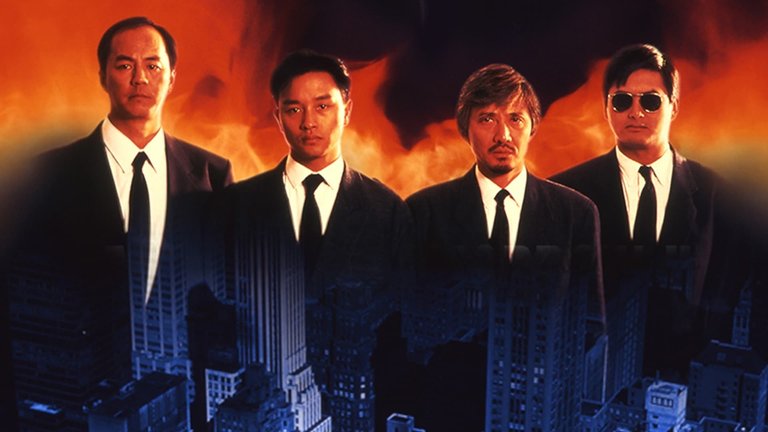Film Review: A Better Tomorrow II (1987)

“Fonzie syndrom” or phenomenon of a supporting character becoming more popular than protagonists thus turning its interpreter into genuine star is usually associated with television. There is less opportunity for that to happen in the realm of feature films, but one of such rare instances was presented by A Better Tomorrow, John Woo’s 1986 Hong Kong action film that turned Chow Yun-fat into international star and major icon of Hong Kong cinema. Success of that film guaranteed the sequel that came next year under title A Better Tomorrow II, reuniting Woo as director and Chow Yun-fat as major star.
This reunion, however, created something a challenge for a screenwriting team, because Chow Yun-fat’s character Mark Lee (or “Brother Mark”) had been killed in violent and melodramatic finale of the first film. Nominal protagonist Sung Tse-ho a.k.a. “Ho” (played by Ti Lung), a career money counterfeiter, is at the beginning of the film in prison, being arrested by his own brother, young and ambitious police detective Sung Tse-kit a.k.a. “Kit” (played by Leslie Cheung). When Chief Inspector Wu (played by Lau Sai-ming) approaches him with an offer of early release in exchange of working as undercover informer in order to collect evidence against his old friend and mentor, former gangster and shipyard owner Lung Sei (played by Dean Shek), Ho refuses. He changes his mind after learning that Kit have already taken the same mission while Kit’s wife Jackie (played by Emily Chu) is expecting baby. Kit’s mission, during which he becomes close to Lung’s daughter Peggy (played by Regina Kent), is dangerous despite Lung actually being a legitimate businessman. Lung’s subordinate Ko Ying-pui (played by Kwan Shan) has different ideas and he arranges assassination of gangland boss Mr. Wong (played by Ng Man-tat) and frames Lung for it in order to take over Lung’s shipyard and use it for counterfeiting operation. Peggy gets killed and Lung, who has escaped to New York City, goes insane because of grief. Mark Lee’s twin brother Kenneth a.k.a. “Brother Ken” (played by Chow Yun-fat) is a restaurant owner who takes care of Lung and gradually nurses him back to sanity before two of them decide to return to Hong Kong and join Ho and Kit in taking down Ko’s newly built criminal empire.
The easiest way to describe A Better Tomorrow II is “messy”. Like most sequels, it is inferior in quality to the previous film, and that could be explained with lack of originality in the script and with Woo and his producer Tsui Hark not exactly knowing whether they were making a sequel or a remake. Many motives from the original plot appear recycled and the idea of bringing Chow Yun-fat back on screen by giving his iconic character a twin brother (who also happens to possess impressive gunfighting skills) looks more suited for soap operas than feature film. Brother Ken, however, appears relatively late in the film and Chow Yun-fat, much to his credit, does wonders with the role, making the character both similar and very different from Brother Mark, while keeping his iconic “coolness”. Dean Shek is also very good in his role of an old gangland boss who loses and regains sanity and his performance looks even more impressive in light of the fact that he was relatively young actor who would retire from film acting few years later. Ti Lung and Leslie Cheung are also good, although their characters have already been established and they can’t bring anything particularly new to the screen.
Much of the film’s problems are the result of serious creative differences between Woo and Tsui Hark, which mainly revolved over whether the film would have more emphasis on original characters or Lung. Both Woo and Hark were editing their own versions of film in post-production, with final version being rather unsatisfactory compromise between the two, with relatively short running time and plot being rushed. However, the formula established in previous film – pathos, celebration of friendship, duty and honour mixed with extreme violence – still works. The final scene, in which protagonists armed with guns, grenades and couple of swords take down battalions of Ko’s henchmen and spray the screen with hectolitres of blood in the process, is brilliantly staged and represents the prime example of “heroic bloddshed” subgenre of Hong Kong cinema. The scene, which nearly cost Chow Yun-fat his life over pyrotechnics effects gone wrong, also represents another example of Woo’s superb directorial skills. Despite commercial success Woo wasn’t pleased with A Better Tomorrow II and publicly disowned it, although other film makers would praise it and even pay homage to it in their work (like Quentin Tarantino in True Romance). Tsui Hark continued series as director of the third film, a prequel titled A Better Tomorrow III: Love & Death in Saigon.
RATING: 6/10 (++)
_
Blog in Croatian https://draxblog.com
Blog in English https://draxreview.wordpress.com/
InLeo blog https://inleo.io/@drax.leo
InLeo: https://inleo.io/signup?referral=drax.leo
Unstoppable Domains: https://unstoppabledomains.com/?ref=3fc23fc42c1b417
Hiveonboard: https://hiveonboard.com?ref=drax y
Bitcoin Lightning HIVE donations: https://v4v.app/v1/lnurlp/qrcode/drax
Rising Star game: https://www.risingstargame.com?referrer=drax
1Inch: https://1inch.exchange/#/r/0x83823d8CCB74F828148258BB4457642124b1328e
BTC donations: 1EWxiMiP6iiG9rger3NuUSd6HByaxQWafG
ETH donations: 0xB305F144323b99e6f8b1d66f5D7DE78B498C32A7
Posted using CineTV
